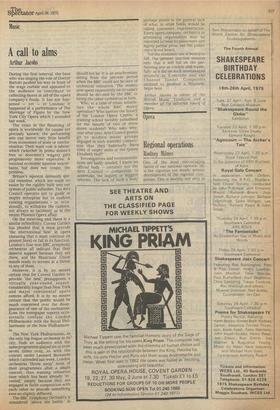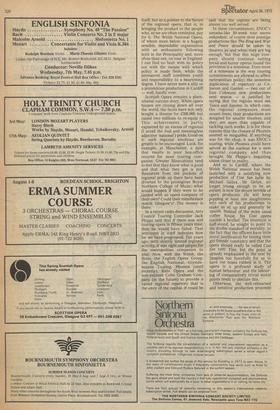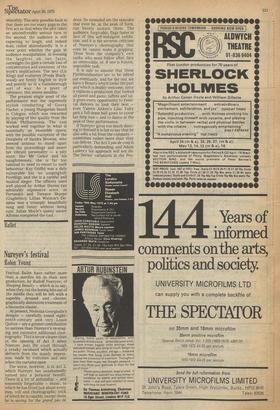Opera
Regional operations
Rodney Milnes
One of the most encouraging facets of our national operatic life is the vigorous yet steady artistic development of the regional companies. This is healthy not only in
itself, but as a pointer to the future of the regional opera, that is, in bringing the product to the people who, as we are often reminded, pay for it. The Welsh National Opera, of whom more below, is a hugely sensible, dependable organisation with an enthusiastic following both in the Principality and, more often than not, on tour in England. I can find no fault with its policy nor with the means with which policy is made flesh, while the permanent staff combines youth and responsibility to a heartening degree. I have never seen a silly or a pretentious production in Cardiff — well, hardly ever.
Scottish Opera remains a phenomenal success story. While opera houses are closing down all over the world, the Scots have not only bought a theatre for £300,000 but raised two millions to re-equip it. This achievement is partly explained by an excess of regional (I avoid the foul and meaningless adjective 'national') pride. Good on it: such regional emotions are greatly to be encouraged. Look, for example, at Manchester, a date that results in poor box-office returns for most touring companies; Greater Mancunians tend to feel that they know what is good and that what they 'get is not. Resources from the pockets of regional pride up there have been diverted to the prestigious Royal Northern College of Music; what would happen if they were to be ,landed with an opera company of their own? Could their munificence match Glasgow's? The money is there.
In a recent radio discussion, Arts Council Touring Controller Jack Phipps said that if there was still touring-opera in fifteen years time, then he would have failed. That sentiment in itself indicates how . far we have progressed. Ten years ago, with strictly limited regional activity, it was right and proper for the metropolitan companies to tour. Now, with the Welsh, the Scots, the English Opera Group, the English National, Glyndebourne Touring, Phoenix (until recently), Kent Opera and the non-existent Colin Graham Company (in the future) to provide a ' varied regional repertory that is the envy of the capital, it could be
said that the regions are being almost too well served.
In these circumstances, ENOC's amoeba-like 20-week tour seems redundant; of course their prestige productions like The Ring and ,War and Peace should be taken to theatres as and when they are big enough, but that this huge company should continue tatting bread-and-butter operas round the provinces is a nonsense. Even more of a nonsense is the way touring commitments are allowed to affect metropolitan policy; the senseless duplication of repertory at Coliseum and Garden — two out of four Coliseum new productions next season — is justified by saying that the regions must see Tosco and Salome. In which case, the regional companies must mount them; their productions are designed for smaller theatres, and they are more than capable of tackling such works. It is for these reasons that the closure of Phoenix seemed so misguided. If anything was for the chop, it was ENOC's touring, while Phoenix could have served as the nucleus for a new regional company and thus brought Mr Phipps's beguiling vision closer to reality.
And so to Cardiff, where the Welsh National season has been launched with a satisfying new production of Cost fan tutte by Michael Geliot. Mr Geliot, no longer young enough to be an enfant, is now the doyen terrible of opera producers. He will keep popping at least one naughtiness into each of his productions to make us sit up and generally be epatds. Instead of the more usual coffee house, his Cost opens outside a brothel. The intention is half-sound; he sought to point to the double standard of morality, to the fact that the officers have little moral justification for testing their girl friends' constancy and that the opera should really be called Cost fan tutti. Fine, but the point is already emphasised in the text by Despina too forcefully for us to have our noses rubbed in it. The opera is a profound study of human behaviour, and the labouring of comparatively trivial moral points tends to obscure this.
Otherwise, the well-rehearsed and sensitive production proceeds smoothly. The only possible fault is that there are too many gags in the first act so that when the plot takes an uncomfortably serious turn in the second, the audience is still expecting to laugh, and indeed does, rather shamefacedly. It is a moot point whether the gain in audience manipulation, in freezing the laughter on our faces, outweighs the gain a certain loss of concentration and awarenes of the work's implications. The sets (Liz King) and costumes (Freda Blackwood) are firmly English in style and prettily so in a Gainsborough sort of way. As a point of reference, this seems sensible.
The greatest single asset of the performance was the supremely stylish conducting of Georg Fischer, a young Hungarian based in Cologne, which was rewarded by playing of like quality from the Welsh Philharmonia. The cast worked well together in what is essentially an ensemble opera, with the possible exception of the Dorabella of Sandra Browne, who seemed anxious to stand apart from the proceedings and assert her vibrant personality — a pity since, like Mr Geliot and his naughtinesses, she is far too talented to need to resort to such behaviour. Kay Griffel was a duly vulnerable but no unsprightly Fiordiligi, and she is a careful and musical singer. The officers were well played by Arthur Davies (an admirably expressive actor, as Ferrando) and Terence Sharpe (Guglielmo). Lillian Watson's Despina was a triumph: beautifully sung and funny without being cute. Julian Moyle's quiety aware Alfonso completed the cast. deux. So extended are the episodes that even he, at the peak of form, can barely sustain them. The audience, forgivably, flags faster in face of this self-indulgent exhibition, and it is the severest criticism of Nureyev's choreography that even he cannot make it gripping. Those from the company's own ranks, who must follow after, face an unenviable, or, if one is honest, impossible task.
It is safe to assume that these Florimundanities are to be edited out eventually, and for the rest we have a Beauty which looks the part and which is doubly welcome, since it replaces a production that looked all pastel and paste, taffeta and tat. It gives every opportunity to Festival dancers to look their best — even Valerie Aitken's Lilac Fairy gets a full-dress ball gown to cover her limp line — and to dance at the peak of their performance.
If Nureyev gives too Much dancing to himself it is fair to Say that he also asks a lot from the company — sometimes rather more than they can deliver. The Act 3 pas de cinq is particularly demanding, and Adam Luders's lax approach will not do. The fairies' variations in the Pro












































 Previous page
Previous page